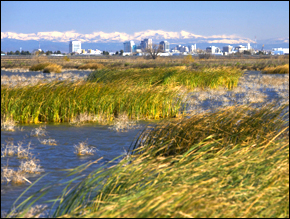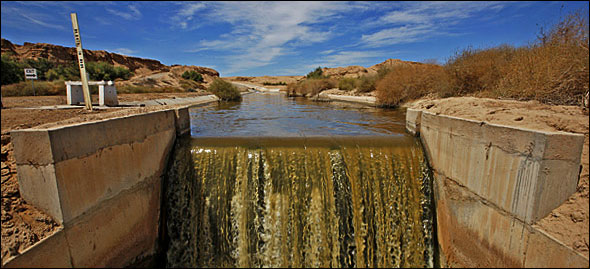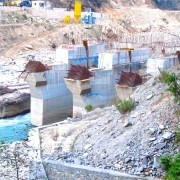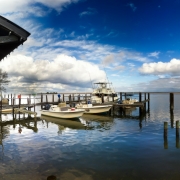Peter Gleick: California Water Bills. Is the New Water Legislation Better than Nothing?

After months of negotiations, wrangling, lobbying, and deal-making, much of it behind closed doors and out of public view, the California legislature has just passed a major new water package that includes both complex policy changes and a huge bond request that the voters will be asked to approve.
Despite the happy face being put on by some of the bill’s supporters, including Governor Schwarzenegger, I doubt anyone is truly happy with the end result. Perhaps that’s too much to expect for a topic as complex as California water and for a bill that tries to do so much at once. I’m certainly not happy, but I believe there was a (mostly) good faith effort on the part of the governor and the legislators and all the other water interest groups to try and produce something.
What will be the ultimate outcome? Are we going to be better off with this bill than with no bill? Will California legislators now say they are done dealing with water, and refuse to tackle the unaddressed, partially addressed, or badly addressed issues? If so, then this package isn’t going to be nearly enough. But if instead legislators and other water interests treat it as a beginning, not an end, and work to build and improve on the good pieces, it could be a major step forward. We’ll have to wait and see how it changes our actual water problems.
The worst thing about the bill was the process. Too few powerful interests had too much power to determine the content. Anyone who thinks the days of smoke-filled, back-room deals are over is wrong (except, perhaps, about the smoke). Too many other people, communities, and organizations were left out of the process. And while many of us were pressured to support, or oppose, the bills by various friends and colleagues, it became impossible to even understand what bill we were being asked to support, as day by day, hour by hour, good pieces were cut out or weakened and bad things inserted. Even at the very last minute, the bill was significantly watered down in desperate deals cut by a few special interests. This is bad, bad process.
The biggest problems with California water have still not been addressed or fixed in these bills and the most productive question is, how can we move forward from here?
Water Number: Here are four key unaddressed issues:
1. The State must still figure out how to measure, monitor, and report every single water use. As stunning as it may seem to outsiders, we still aren’t measuring and metering all water uses, and the new legislation doesn’t require us to. Imagine that you had a bank account, but you didn’t know how much money was in it, you didn’t know how much money was going in each month, and you didn’t know how much was being taken out. That’s our water use situation. And while that ignorance benefits some special interests, it is irresponsible. The modest requirements for comprehensive monitoring groundwater levels in earlier versions of the bill were fatally weakened at the last minute and there are still no requirements for reporting actual groundwater use or all other uses.
2. The State Water Resources Control Board, responsible for overseeing water rights, enforcing allocations, and preventing water theft and unreasonable use is far too weak. I’ve written about this earlier. The Board is hamstrung by politics and budget constraints. The new bill does not fix those problems and, in the worst case of last minute, back-room dealing, the modest efforts to strengthen the Board’s ability to monitor, enforce, and penalize were stripped out or severely weakened.
3. Some bill supporters claim the bill will “implement the Governor’s call to improve water use efficiency by 20 percent by 2020.” If only that were true. Very modest targets for improving water-use efficiency were set in the bill for urban users only, and even these are not mandatory or enforceable. More outrageously, however, no such targets were set for agriculture, which uses 80% of the water used by humans in California. Agriculture remains largely unaccountable for how they use water.
4. The only sustainable way to support effective water management is through a user fee on water use. In the long run, asking the voters for bond after bond will not work. We pay for electricity; we pay for milk. The more we use, the more we pay. All users should pay a fee for water use based on the volume of water used. This too was stripped out of early versions of the legislation.
Two additional key uncertainties stand out in the current bills:
– We don’t really know how the new institutional management structure for the Sacramento-San Joaquin Delta is going to play out or whether the bill’s environmental improvements — strongly supported by some in the environmental community — will materialize. It’s a big unknown. But the health of the Delta is central to the problems we face and while key elements of the bill may lead to ecosystem restoration, they may not. For some supporters, those potential successes were enough to outweigh the other liabilities. But it is a gamble.
– We still don’t really know if there is going to be a major new “peripheral” canal, what it is going to look like, where it is going to be built, and how it is going to be operated. Nor are there any guarantees that ecosystem protections will be strengthened enough to save the Delta if such a canal is built. Some supporters believe (and some bill opponents fear) this bill will smooth the way for a new canal. Time will tell.
If the new California water bill is all there is, it will not be enough to solve our water problems. If this is a first baby step toward fixing problems that have been ignored for a century, then I look forward to the next steps. Soon.
Peter Gleick
Dr. Gleick’s blog posts are provided in cooperation with the SFGate. Previous posts can be found here.











Leave a Reply
Want to join the discussion?Feel free to contribute!